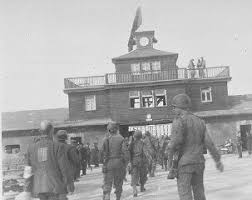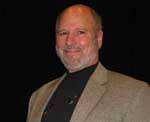
By Jerry Klinger

BOYNTON BEACH, Florida — I asked my synagogue Rabbi why Jews do not have a single, mandated prayer for the Holocaust that all Jews, Haredi to Reform, recite. His answer, while not what I wanted, was plain.
“Perhaps in 200-300 years,’ ‘he said, “we (the Rabbinate) will have the perspective of time to compose a prayer of memory for the Holocaust, but not now. It is too close, too shaped by the feelings of the still living and their children.”
There is still no Halachically mandated or required Holocaust prayer.
Memory, especially historical memory, is frequently opaque for political reasons.
April 11, 1945, eighty years ago, the American army liberated the Buchenwald Concentration Camp. American sources recognize that event and date. The Germans do not.
In 2019, the Jewish American Society for Historic Preservation proposed to the Buchenwald Memorial, the German authorities who ran the Buchenwald Concentration Camp historical site, a memorial honoring the American liberators of the camp. There was none heretofore. JASHP would pay for it. 2020 was to be the 75th anniversary.
The simple request was explosive for the Germans, especially since it came from a Jewish organization. Even worse, my father was a prisoner who was liberated in Buchenwald, but not on April the 11th.
The reason the proposal was explosive centered on the question of “who liberated” Buchenwald?
For months, inside the Camp, a resistance slowly formed. They managed to acquire a few rifles and some handguns. They also knew they had an impossible situation. Buchenwald was run surrounded by 1,200 heavily armed Nazi SS, dedicated soldiers.
As American forces neared Buchenwald, almost all the Nazis deserted, some ran wearing women’s clothing. A few remained. Sounds of approaching American armor had reached their ears.
The morning of April 11, the Buchenwald International Committee, largely communists and political prisoners, rose in revolt, successfully taking over the camp. It was not difficult.
At 3:15, the American Army arrived in force. The International Committee turned over control to the Americans. The Americans were bewildered. They did not know what they had found. The Camp still had 21,000 prisoners.
It took an extra day before the Americans penetrated the entire massive camp. Not until the 12th did the American forces discover there was a second camp, surrounded by barbed wire and electrified fences, at the bottom of the mountain. That camp was the “Little Camp.” It was the Jewish Camp.
The International Committee that opened the upper camp to the American forces kept the Jewish camp tightly locked down so the Jews could not escape. They said the “Little Camp” was not liberated because the Jewish Camp had typhus and other diseases. It was not safe to let the Jews out. It was not true.
Until the Americans arrived and broke open the chained gates to the “Little Camp,” the Jews were not liberated.
The political firestorm JASHP had created challenged the official narrative of the Buchenwald Memorial and the German Communist Party. The official narrative was that Buchenwald was self-liberated by a prisoner revolt. The party line was that German anti-Nazi prisoners rose up; Buchenwald was not liberated by the Americans.
The fact that the Nazis abandoned the camp because they feared the approaching Americans was discounted, officially rejected.
After a high-level review, despite JASHP’s support from Rick Grennell, President Trump’s Ambassador to Germany, members of the Eisenhower family, American Veterans organizations, and German supporters, the Buchenwald Memorial rejected a simple memorial to the American liberators at Buchenwald. They approved a memorial honoring the American medical units that took care of the liberated prisoners.
A ceremony was planned for the dedication in April 2020. Covid cancelled everything. The memorial was finally installed a few years later, in 2023. They located the small table memorial adjacent to the former S.S. Barracks in Buchenwald.
January 2025, JASHP was approached by German supporters of the original effort to reopen the possibility of a memorial to the American liberators. However, it was determined that arguing the same message that the Buchenwald Memorial had rejected would not be successful. Instead, an irrefutable fact about the American liberation of Buchenwald was the center thrust of the new effort.
If the Germans politically needed the narrative that Buchenwald was self-liberated on April 11, the fact that the “Little Camp”, the “Jewish Camp,” was not liberated until the Americans came and broke open the gates a day or so later was accurate.
JASHP approached the Buchenwald Memorial again with a proposal for a new marker to be placed in the “Little Camp” honoring the U.S. Armed Forces for the Liberation of the Jewish Camp.
As before, the Buchenwald Memorial administration was thrown into a major quandary. After a high level of review and following the recommendation of the Scientific Board of Trustees, the proposal was rejected.
Accepting the proposal would have created a major historical problem for the Buchenwald Memorial and the German political narrative of Buchenwald’s self-liberation. If the International Committee liberated the Camp, why did they not liberate the “Little Camp”? Why were the Jews kept imprisoned until the Americans actually liberated them?
JASHP received a very German response from the Buchenwald Memorial.
“Dear Mr. Klinger,
Thank you for your message and suggestion.
As you know, on your initiative, a memorial site for the XX Corps of the
3rd U.S. Army was already created in a very central location in the
Buchenwald Memorial in April 2023. In coordination with the Scientific
Board of Trustees of our Foundation, this has been formulated in such a
way that there is no need or possibility for another memorial site for
the U.S. Army.
With kind regards,
(Name redacted by JASHP)”
April 11 is the official date for the liberation of Buchenwald. A significant ceremony was held commemorating the self-liberation of the Camp, reflecting it was turned over to the Americans later.
Memory cannot be left to others alone if memory is to be preserved by and for the victims. Political considerations and even false, self-serving narratives keep the truth in the dark until, the hope is, few will care anymore.
It is our responsibility to remember, to never forget.
*
Jerry Klinger is the founding president of the Jewish American Society for Historic Preservation.